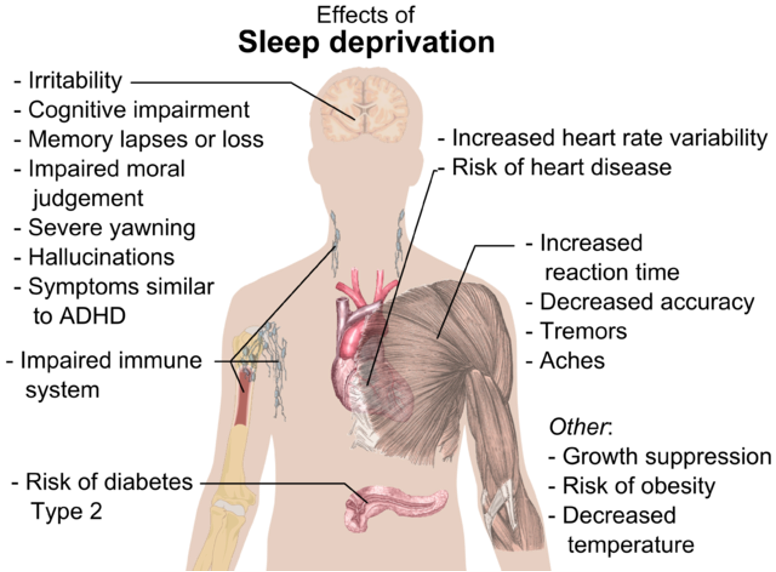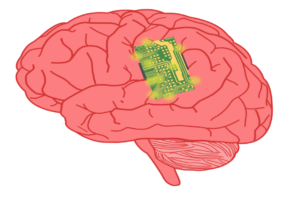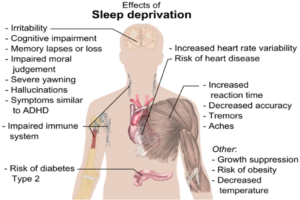
Figure: The image above displays the effects of sleep deprivation on various aspects of physiological function (Source: Wikimedia Commons, Mikael Häggström)
When preparing for an exam, one of the best ways to boost your performance is by getting an optimal amount of sleep. In order to optimize your levels of alertness, the Sleep Foundation recommends that a young adult (between the ages of 18 and 25) should get between 7 and 9 hours of sleep each night (Sleep Foundation, 2021). At its core, sleep serves to regenerate the body, contributing to the restoration of metabolic regulation, temperature regulation, and immune function (Rasch & Born, 2013). All of these functions are correlated with the positive effect that sleep has on the ability of an individual to retain memory.
How does memory consolidation work in the brain? The strength of synaptic connections in the memory network and the process of memory formation are directly dependent on one another, as the process of encoding memory stimulates a neural process known as long-term depression (LTD) (Rasch & Born, 2013). LTD takes place at neural synapses in the hippocampus and has several complicated effects in the brain (Purves et al., 2001). In addition, LTD decreases the excitatory postsynaptic potential (EPSP) and targets particular activated synapses (Purves et al., 2001). EPSP is a neurotransmitter-induced change to the membrane voltage of a postsynaptic cell that increases the chance of initiating a postsynaptic action potential (Purves et al., 2001). This is important for memory encoding in terms of synaptic plasticity which is the ability to rewire neural connections in the brain. Synaptic plasticity additionally controls the efficiency of the communication and exchange between two neurons. Likewise, synaptic plasticity plays an essential role in response to injury, learning new information, remembering experience, and facilitates the brain’s adjustment to new external and environmental conditions.
Sleep has been determined to play an essential role in the consolidation of memory as it inputs newly encoded memory into long-term memory storage (Rasch & Born, 2013). A study conducted by Penelope A. Lewis and Simon J. Durrant at the University of Manchester has generated a model that emphasizes the overlapping replay of related memories, and has the ability to pinpoint and improve shared elements (Lewis & Durrant, 2011). To briefly explain, the model demonstrates that sleep amplifies the connections between several stimuli and during sleep, memories are reactivated in various new combinations. Researchers concluded that when newer memories are being reactivated and replayed in the midst of sleep, the association between the related events strengthens. Fundamentally, sleep is essential for the promotion of building a stronger remembrance of the past (Lewis & Durrant, 2011).
In preparation for your next exam or a big presentation, getting enough sleep will set you up better for success, as you will be more able to efficiently recall information that you committed to memory the night before. Furthermore, getting the optimal amount of sleep on a consistent basis will allow you to remember new information for a longer period of time.
References
- Lewis, P. A., & Durrant, S. J. (2011). Overlapping memory replay during sleep builds cognitive schemata. Trends in cognitive sciences, 15(8), 343–351. https://doi.org/10.1016/j.tics.2011.06.004
- OneCare Media. (2021). How Much Sleep Do We Really Need? Sleep Foundation. https://www.sleepfoundation.org/how-sleep-works/how-much-sleep-do-we-really-need.
- Purves D, Augustine GJ, Fitzpatrick D, et al., editors. (2001). Neuroscience. 2nd edition. Sunderland (MA): Sinauer Associates. Long-Term Synaptic Depression. Available from: https://www.ncbi.nlm.nih.gov/books/NBK10899/
- Rasch, B., & Born, J. (2013). About sleep’s role in memory. Physiological reviews, 93(2), 681–766. https://doi.org/10.1152/physrev.00032.2012
- Takeuchi, M., Furuta, H., Sumiyoshi, T., Suzuki, M., Ochiai, Y., Hosokawa, M., Matsui, M., & Kurachi, M. (2014). Does sleep improve memory organization?. Frontiers in behavioral neuroscience, 8, 65. https://doi.org/10.3389/fnbeh.2014.00065
Related Posts
CellChat Enables Biologists to Understand Cellular Communication
Figure 1: CellChat, an open-source R package, provides researchers with...
Read MoreBrain Computer Interfaces: Approaches to Scientific Innovation
For more related news, check out the UnknownNow, an organization for neuroscience...
Read MoreContradicting the Disparity Between Primate and Avian Brains
Figure 1: A Northwestern Crow near Whittier, Alaska. Corvids, along...
Read MoreThe Connections Between Sleep and Memory
Figure: The image above displays the effects of sleep deprivation...
Read MoreVideo Games Shape Childhood Cognitive Development
Source: Caleb Oquendo The first video game was introduced in...
Read MoreWhy Future A.I Robots Should Be Created With Immutable Code Limiting Singularity
Figure: Sophia, the first robot citizen in the Global A.I...
Read MoreJulia Gainski






